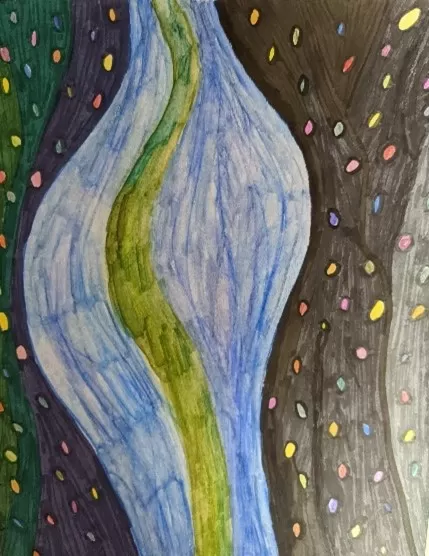
Guest Blogger: Andrea Naranjo Erazo, PhD: Co-director, NIH Academy on Health Disparities and Research Ethics Coordinator, OITE
I grew up with a strong desire to be perfect. Always getting A’s, never getting in trouble, and caring deeply of what others thought of me. This was also reflected in my early paintings, where I placed great attention to details, and captured landscapes perfectly.

My perfectionist tendencies led me to succeed in school and work. I graduated Magna Cum Laude in Chemical Engineering and went to work for a Fortune 500 company. After two years of working in industry I went to pursue my Ph.D. in Chemical Engineering from a top 10 university.
I never questioned my perfectionistic tendencies, in part, because it served me when pursuing whatever my next steps were. Once I reached my second year as a postdoctoral fellow, I started questioning my next step, and the dream of becoming a principal investigator seemed very distant. Not choosing academia and exploring other career pathways filled me with anxiety and uncomfortable emotions at first, but it led me to dig deep inside for my values and priorities in life in order to choose a career path that would fulfill me.
While perfectionism helped me in school and getting where I am professionally, now looking back, perfectionism kept me from learning many important lessons early on: 1) I am more than my achievements, 2) questioning/reframing my perfectionist trends, 3) 3) accepting and loving who I am.
We are more than our achievements

My achievements drove my self-esteem and self-worth. I thought my accomplishments and how well I performed were a reflection of who I was. Imagine the anxiety I felt after I accomplished all my career goals and I did not have any other professional achievement for me to excel at!
Therapy and journaling helped me decouple my achievements from my self-worth. It helped me realize that part of my anxiety was the idea that I was going to disappoint other people for not choosing the expected career path. Being able to let go of what other people think was not easy for me.
Making a list of what I value, and love helped me realized that my achievements do not change who I am at my core. Learning how to embrace the present helped me overcome my anxiety.
Questioning/reframing our perfectionist trends
In letting go of perfectionism, I started noting my thought patterns and how harsh I was on myself. I was set on an expected path, and I was not open to the opportunities available to me.
The OITE’s Becoming a Resilient Scientist Series introduced me to Jackal and Giraffe language from nonviolent communication. The giraffe is the land animal with the biggest heart and stands for compassionate communication. The jackal represents competition. Jackal language is about judging, criticizing, analyzing, and accusing. I realized that I used more of a jackal language on myself. I started to journal about these thoughts and reframing my thoughts by asking “how would a giraffe say it?”
With practice, I became more aware of my thoughts, and I went from self-criticism to self-kindness.

Accepting and loving ourselves
I did not realize that perfectionism kept me from accepting myself just the way I am. It kept me from realizing our common humanity, we all make mistakes, and there is no such a thing as perfect person.
With this realization, I went from people pleasing to self-acceptance. From feeling inadequate to feeling “I am enough.” From “I am not good enough” to “I am not there yet.”
As I embrace who I am, I have embraced my uniqueness and my inherent value as a human that’s not contingent on my achievements. And now, I use my art is an opportunity to express my feelings and thoughts (and not just focus on perfectly capturing a landscape).
“To love oneself is the beginning of a lifelong romance!”-Oscar Wilde.





